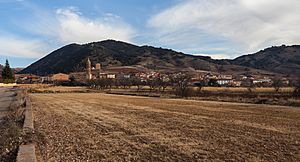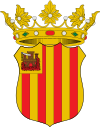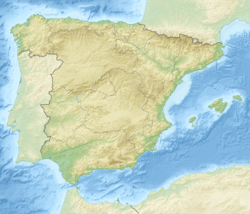Báguena facts for kids
Quick facts for kids
Báguena
|
|||
|---|---|---|---|
|
|||
 |
|||
| Country | Spain | ||
| Autonomous community | Aragon | ||
| Province | Teruel | ||
| Comarca | Jiloca Comarca | ||
| Area | |||
| • Total | 25.17 km2 (9.72 sq mi) | ||
| Population
(2018)
|
|||
| • Total | 311 | ||
| • Density | 12.356/km2 (32.00/sq mi) | ||
| Time zone | UTC+1 (CET) | ||
| • Summer (DST) | UTC+2 (CEST) | ||
Báguena is a small town, also called a municipality, located in the province of Teruel. This province is part of Aragon, one of Spain's autonomous communities. In 2004, a count of people living there, called a census, showed that Báguena had 416 residents. By 2018, the population was 311 people.
Contents
What is Báguena?
Báguena is a municipality in Spain. A municipality is like a local area with its own government. It includes a town or village and the land around it. Báguena is found in the Jiloca Comarca, which is a region in Aragon.
Where is Báguena Located?
Báguena is in the central part of the province of Teruel. This province is in eastern Spain. It is part of the larger region known as Aragon. The town sits in a valley, which means it's surrounded by hills or mountains.
Understanding Spain's Regions
Spain is divided into different areas. First, there are 17 "autonomous communities," like Aragon. These are similar to states or large regions. Inside these communities are "provinces," like Teruel. Provinces are then divided into smaller "municipalities," like Báguena.
Life in Báguena
Life in a small municipality like Báguena is often quiet. People usually know each other well. The economy might depend on farming or local businesses. Small towns often have strong community traditions.
Population Changes Over Time
The number of people living in Báguena has changed. In 2004, there were 416 residents. By 2018, this number went down to 311. It is common for small towns in some areas to see their populations change over the years.
What is a Census?
A census is an official count of a population. Governments do this to find out how many people live in an area. It helps them understand communities and plan for things like schools or services. The INE is the group that does the census in Spain.
See also
 In Spanish: Báguena para niños
In Spanish: Báguena para niños




